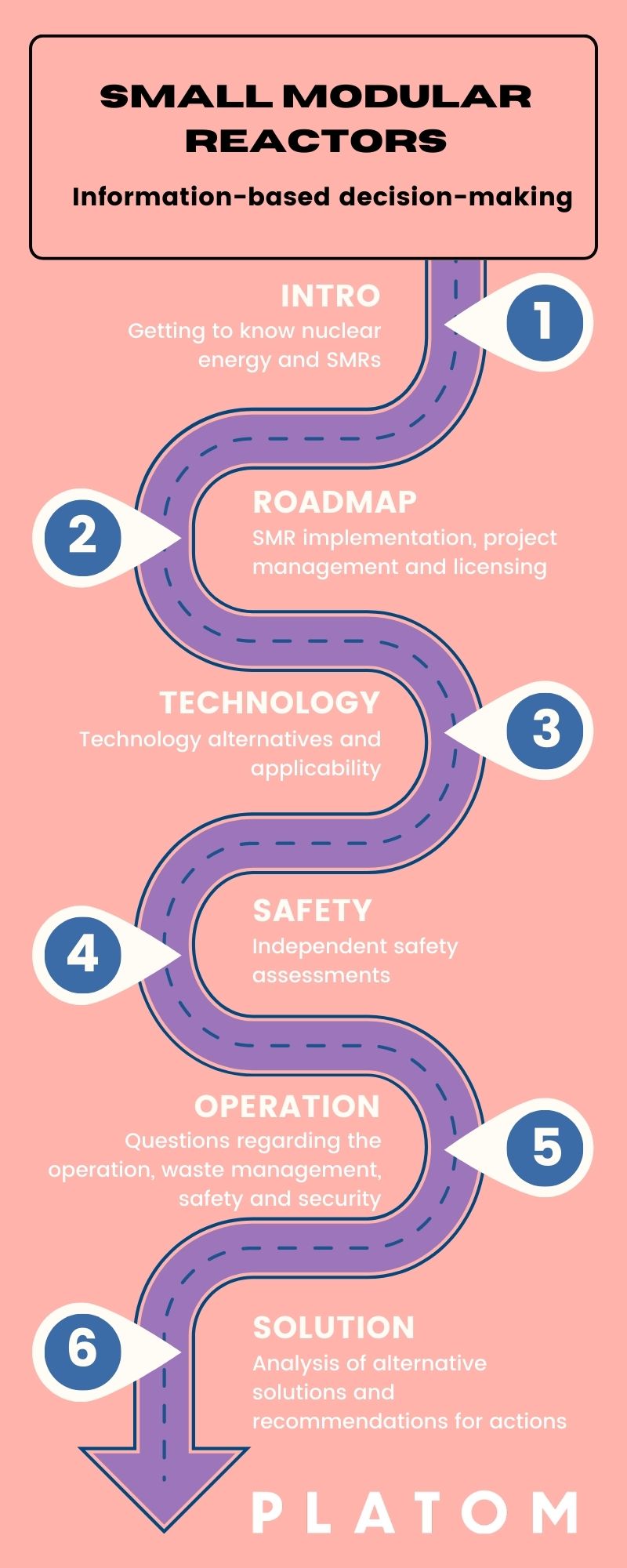Getting to know SMRs
We at Platom support our customers who are interested in nuclear energy to familiarise themselves with the possibilities of small modular reactors. With our help, you can see the big picture, which enables informed decision-making in your questions related to energy production, safety, and technology.
Our SMR service is always individually tailored, considering your needs and the requirements of the operating environment. We will provide you with an overview of the available options regarding small modular reactors. We map out suitable technologies for you and evaluate the pros and cons of the alternatives. The different stages of the licensing process will be described and required information provided on matters related to site selection, radioactive waste treatment, nuclear safeguards, security arrangements, nuclear liability, and plant operation. We will provide recommendations on options for moving forward and expert opinions to support decision-making. With our assistance you can increase your understanding of the special characteristics of the nuclear industry, and you will be able to consider the possibilities of small modular reactors in your long-term plans.
We support, train, help, advise and assess
The SMR service includes the following stages.
| Stage | Description |
|---|---|
| 1. INTRO | Getting to know the special features of nuclear energy |
| 2. ROADMAP | Overall picture of SMR project implementation, project management and licensing |
| 3. TECHNOLOGIES | Technology options and their applicability |
| 4. SAFETY | Independent safety assessments |
| 5. OPERATION | Issues related to energy production, waste management and safety |
| 6. SOLUTION | Analysis of the alternative solutions and scenarios moving forward |
We implement the service in close cooperation with the customer. As a result of this work, we can produce expert reports, presentations, and operational procedures according to the customer’s needs.
We can tailor the depth and content of the service according to your needs and, if necessary, flexibly implement only certain parts of the service. For example, we can analyse the suitability of a certain plant type for the needs of your district heating network using a simulation model. Platom’s experts are also experienced trainers and are happy to arrange training tailored to your needs on various topics in the field of nuclear energy.
Our goal is that our customer’s decision-making related to nuclear energy is based on the best available information and existing legislation. Our service enables you to utilise the opportunities provided by nuclear energy optimally in energy-related decisions that extend far into the future.

Your partner in nuclear energy
Platom is a Finnish family-owned company specializing in nuclear energy. We have been supporting international nuclear projects for over 25 years. Our expertise cover the entire life cycle of nuclear facilities, from construction to decommissioning and final disposal.
We support the implementation of our customers’ nuclear energy projects and can even carry out system deliveries to nuclear facilities. We have strong expertise in nuclear technology and licensing, as well as regulatory requirements. We are actively involved in developing legislation and guidelines related to nuclear energy. Our goal is to enable sustainable energy production by promoting the development of environmentally friendly, safe and cost-effective nuclear energy production.
Platom is an expert company independent of specific technologies and plant suppliers. Our strength lies in our ability to operate in an agile and flexible manner based on customer needs. Platom employs a diverse and extensive group of experts with experience in the field of nuclear energy. We strive for long-term customer relationships and partnerships.
Support for decision-making with 25 years of experience
Contact us
Q&A
What is SMR?
SMR stands for small modular reactor. The term generally refers to reactor types whose design takes into account the benefits of serial and factory production. Although the term also refers to small size, SMR includes all modular reactors with an electrical output of less than 300 MW (IAEA’s definition). For comparison, the units in Loviisa have a capacity of approximately 500 MW and Olkiluoto 900 MW and 1600 MW.
A good information package on small modular reactors can be found in the brochure produced by Think Atom, which is available at: Pienreaktorit ja niiden käyttökohteet (only in Finnish)
Information on the licensing process (STUK, 2019): Edellytykset pienreaktorien turvalliselle käytölle (only in Finnish)
Are SMRs safe to use?
Many small reactors have good features from a safety perspective. Despite the good safety features, nuclear and radiation safety must always be approached with sufficient diligence, and safety shall be assessed case-by-case. The nuclear industry has always had a high level of safety culture in Finland.
Compared to a large nuclear power plant, the smaller size of a small nuclear power plant reduces the amount of radioactive substances and the residual heat generated, among other things, and enables simpler operation through automation and passive safety systems.
In favour of SMRs, a significantly smaller emergency planning zone than a large nuclear power plant is expected, which enables a more flexible choice of plant site. It is expected that the upcoming reform of Finnish nuclear energy legislation will enable the definition of risk-based emergency planning zone sizing.
Advantages and benefits of SMRs
The advantages and benefits of small modular reactors depend to a large extent on the end use application, the technology chosen and the future development of the operating environment. In general, it can be estimated that compared to a large nuclear power plant, the advantages of SMRs come from their smaller size and simplicity of technology, as well as the possibility of serial production. These factors can allow for relatively lower costs, faster construction phases and more flexible geographical placement and capacity. Compared to wind and solar energy, nuclear energy is independent of weather and seasons.
Nuclear power is also good for climate because the lifecycle CO2 emissions of a nuclear power plant are very low. (source: World Nuclear Association “Carbon Dioxide Emissions From Electricity” and UN “Carbon Neutrality in the UNECE Region: Integrated Life-cycle Assessment of Electricity Sources“).
When SMRs will be available?
The construction of a nuclear power plant is a project of several years. The industry estimates that the first SMRs could be in operation in Finland in the 2030s. At the moment, the construction of a SMR in Finland still involves certain unresolved issues, such as the management of and nuclear liability. The upcoming reform of nuclear energy legislation will also affect the implementation schedule of small modular reactors.
Electricity, heat or both?
Most of today’s operating nuclear power plants generate electricity. In addition to electricity production, new small reactor technologies are also being developed into technologies specialising in heat production. These enable the implementation of nuclear energy for district heating or industrial heat needs, or even combined heat and power production.
Hydrogen production is also one of the utilization opportunities of SMRs.
Nuclear energy as part of the fight against climate change
Nuclear energy can be a good partner for renewables such as for example wind power. The characteristics of nuclear power include a high capacity factor as well as stable and predictable production. These features reduce the risks related to energy availability and price, and that makes nuclear energy an attractive option, especially when the energy demand is long-term and high. The energy output of a SMR can also be adapted to follow demand, considering intermittent production methods and changes in the end user demand in electricity grids or heat networks.
